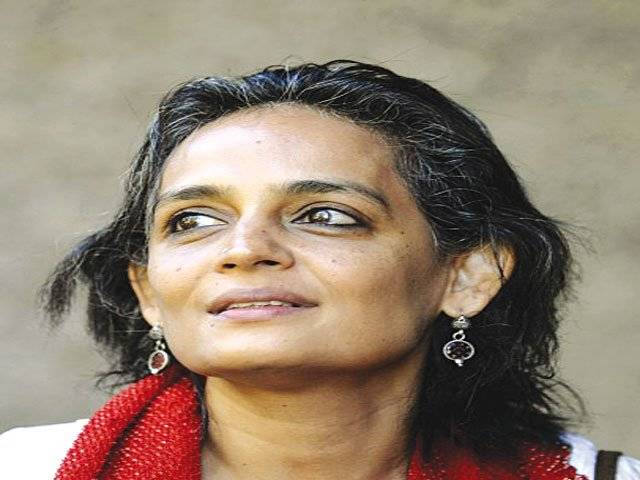NEW YORK - Prominent Indian author and activist Arundhati Roy has called for demilitarisation of Kashmir to open the way for the people to exercise their right to self-determination and to bring to an end the brutal Indian occupation of the disputed territory. I want to say unambiguously that I do not think any country that calls itself a democracy has the right to force people to remain in it in a militaristic way, the way that India is doing in order to prove that its a secular country, she said in the course of a panel discussion on 'Kashmir: The Case for Freedom at Asia Society. I think that the people of Kashmir have the right to self-determination - they have the right to choose who they want to be, and how they want to be, she told a large American audience. Kashmir is one of the most protracted occupations in the world -and one of the most ignored, Roy said. While India brutalises Kashmir in so many ways that occupation brutalises the Indians, she said. It (the occupation) turns us into a people who are able to bear a kind of morally reprehensible behaviour done in our name, and the fact that so few Indians will stand up and say anything about it is such a sad thing. Along with demilitarisation of Kashmir, she called for revoking the Armed Forces Special Powers Act (AFSPA) that the Indian military uses to oppress the Kashmiri people. In her remarks, she lamented the fact that so little is known about the atrocities being committed by more than half a million Indian troops, the continuing repression and indignities let loose on Kashmiri men, women and children. More than 700,000 troops were concentrated in the tiny valley, with checkpoints at every nook and corner of Kashmiri towns and cities. The huge Indian presence is in sharp contrast with 160,000 US troops in Iraq, she pointed out. Two other scholars - noted writer Pankaj Mishra and a PhD student, Muhammad Junaid from IHK - also deplored the fact that the international community gave such little attention to the suffering of the Kashmiri people. Both Mishra and Junaid read out their respective papers containing moving stories of the Kashmiri victims of brutalities of Indian occupation forces. Under the Indian military rule in Kashmir, Roy added, freedom of speech is non-existent, and human rights abuses were routine. Elections were rigged and the press was controlled. She said the lives of Kashmiris were made miserable by gun-toting security personnel, harassed and terrorised people with impunity. Disappearances are almost a daily occurrence as also kidnapping, arrests, fake encounters and torture. Mass graves have been discovered and the conscience of the world remained unstirred. Roy attributed the apathy towards Kashmir, especially in the western world, to their pursuit of commercial interests in India where they were more eager to sell their goods than human rights. India had also successfully used the argument that if it gave up Kashmir, another Islamic state would emerge - a prospect the West feared. Thats why India had made no effort to bring back to the Valley the Kashmiri Pundits who fled to camps in New Delhi at the height of the 1998 uprising in the state. Arent 7000,000 troops enough to protect the Pundits? Even as the world speaks about the Arab spring - three years ago there was massive unarmed uprising in the streets of Kashmir, she said, adding that the Indian army or the security forces were not looking away; they were killing young children: Why the international community doesnt see that when you have two nuclear-armed states, like Pakistan and India, there couldnt be a better thing than a buffer state like Kashmir between them, instead of it being a conflict that is going to spark a nuclear war. Roy acknowledged that Islamic sentiment was prevalent in IHK, but the Kashmiris were not radicals as India portrayed them. In this regard, she strongly deplored the Indian attempts to demonise Kashmiris who were moderate Muslims. She reminded that before his election, President Barack Obama had pledged to resolve the international dispute of Kashmir between Pakistan and India. But seeing 'consternation in India over the remark, Obama hasnt said a word about Kashmir since, she said, adding that he was more interested in selling military aircraft and Boeings to India. Despite the threat of being slapped with sedition cases, she told the Americans that Kashmir was not an integral part of India, as New Delhi claimed. She reiterated that Kashmir was never part of India historically. Secularism was a misnomer in India, she said, citing the killing of Muslims and other minorities across the country. Was the killing spree in Indian Gujarat several years ago represented secularism. India should find some other word for secularism.
Friday, April 19, 2024
Arundhati Roy calls for Kashmir demilitarisation

Pak economy improving, funds will be provided on request: IMF
9:57 PM | April 19, 2024
Minister advocates for IT growth with public-private collaboration
9:57 PM | April 19, 2024
Judges' letter: IHC seeks suggestions from all judges
9:55 PM | April 19, 2024
Formula 1 returns to China for Round 5
9:05 PM | April 19, 2024
Germany head coach Julian Nagelsmann extends contract till 2026 World Cup
9:00 PM | April 19, 2024
A Tense Neighbourhood
April 19, 2024
Dubai Underwater
April 19, 2024
X Debate Continues
April 19, 2024
Hepatitis Challenge
April 18, 2024
IMF Predictions
April 18, 2024
Kite tragedy
April 19, 2024
Discipline dilemma
April 19, 2024
Urgent plea
April 19, 2024
Justice denied
April 18, 2024
AI dilemmas unveiled
April 18, 2024
ePaper - Nawaiwaqt
Advertisement
Nawaiwaqt Group | Copyright © 2024





